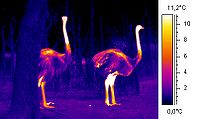
Photo from wikipedia
Abstract Timing of reproduction can influence individual fitness whereby early breeders tend to have higher reproductive success than late breeders. However, the fitness consequences of timing of breeding may also… Click to show full abstract
Abstract Timing of reproduction can influence individual fitness whereby early breeders tend to have higher reproductive success than late breeders. However, the fitness consequences of timing of breeding may also be influenced by environmental conditions after the commencement of breeding. We tested whether ambient temperatures during the incubation and early nestling periods modulated the effect of laying date on brood size and dominant juvenile survival in gray jays (Perisoreus canadensis), a sedentary boreal species whose late winter nesting depends, in part, on caches of perishable food. Previous evidence has suggested that warmer temperatures degrade the quality of these food hoards, and we asked whether warmer ambient temperatures during the incubation and early nestling periods would be associated with smaller brood sizes and lower summer survival of dominant juveniles. We used 38 years of data from a range‐edge population of gray jays in Algonquin Provincial Park, Ontario, where the population has declined over 50% since the study began. Consistent with the “hoard‐rot” hypothesis, we found that cold temperatures during incubation were associated with larger brood sizes in later breeding attempts, but temperatures had little effect on brood size for females breeding early in the season. This is the first evidence that laying date and temperature during incubation interactively influence brood size in any bird species. We did not find evidence that ambient temperatures during the incubation period or early part of the nestling period influenced summer survival of dominant juveniles. Our findings provide evidence that warming temperatures are associated with some aspects of reduced reproductive performance in a species that is reliant on cold temperatures to store perishable food caches, some of which are later consumed during the reproductive period.
Journal Title: Ecology and Evolution
Year Published: 2017
Link to full text (if available)
Share on Social Media: Sign Up to like & get
recommendations!